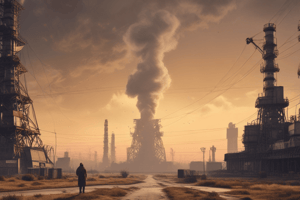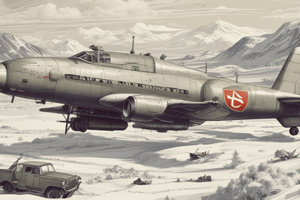Podcast
Questions and Answers
What best describes the economic transformation undertaken by former Soviet states after the fall of the Soviet Union?
What best describes the economic transformation undertaken by former Soviet states after the fall of the Soviet Union?
- A balanced approach between capitalism and socialism.
- A gradual shift towards socialism.
- An emphasis on preserving state-run enterprises.
- A complete dismantling of socialist structures. (correct)
What was one of the primary consequences of 'Shock Therapy' on the economies of former second world countries?
What was one of the primary consequences of 'Shock Therapy' on the economies of former second world countries?
- Increase in government subsidies.
- Strengthening of existing trade alliances.
- Rapid economic growth and stability.
- Destruction of social welfare systems. (correct)
Which countries explicitly sought to join the European Union and NATO after gaining independence?
Which countries explicitly sought to join the European Union and NATO after gaining independence?
- Russia and Ukraine.
- Caucasus nations.
- Baltic and East European states. (correct)
- Central Asian countries.
What does the term 'Shock Therapy' refer to in the context of post-communist regimes?
What does the term 'Shock Therapy' refer to in the context of post-communist regimes?
Which region experienced civil wars and various sectarian conflicts in the aftermath of the Soviet Union's dissolution?
Which region experienced civil wars and various sectarian conflicts in the aftermath of the Soviet Union's dissolution?
In the aftermath of 'Shock Therapy', what happened to the Russian ruble?
In the aftermath of 'Shock Therapy', what happened to the Russian ruble?
What priority was largely overlooked during the implementation of economic transformations in post-communist countries?
What priority was largely overlooked during the implementation of economic transformations in post-communist countries?
Which two regions within Russia experienced violent secessionist movements?
Which two regions within Russia experienced violent secessionist movements?
What event occurred first in the timeline provided?
What event occurred first in the timeline provided?
Which agreement forms the basis for India’s strategic relations with Russia?
Which agreement forms the basis for India’s strategic relations with Russia?
Which of the following nations did not declare independence during the dissolution of Yugoslavia?
Which of the following nations did not declare independence during the dissolution of Yugoslavia?
Which country was the first republic to declare independence from the Soviet Union?
Which country was the first republic to declare independence from the Soviet Union?
What significant political change did Gorbachev initiate in February 1990?
What significant political change did Gorbachev initiate in February 1990?
What was the outcome of the August 1991 coup attempt against Gorbachev?
What was the outcome of the August 1991 coup attempt against Gorbachev?
Which of the following was NOT a republic that joined the Commonwealth of Independent States after the dissolution of the USSR?
Which of the following was NOT a republic that joined the Commonwealth of Independent States after the dissolution of the USSR?
What characterized India’s foreign policy towards post-communist countries?
What characterized India’s foreign policy towards post-communist countries?
What was one of the primary reasons for the disintegration of the Soviet Union?
What was one of the primary reasons for the disintegration of the Soviet Union?
Which of the following statements accurately describes the political landscape after the disbanding of the USSR?
Which of the following statements accurately describes the political landscape after the disbanding of the USSR?
What ideology became dominant internationally after the collapse of the Soviet Union?
What ideology became dominant internationally after the collapse of the Soviet Union?
What was one of the consequences of the Soviet Union's disintegration regarding global power relations?
What was one of the consequences of the Soviet Union's disintegration regarding global power relations?
What led to widespread consumer shortages in the Soviet Union before its disintegration?
What led to widespread consumer shortages in the Soviet Union before its disintegration?
What was one significant aspect of public sentiment towards Gorbachev's reforms?
What was one significant aspect of public sentiment towards Gorbachev's reforms?
How did the centralization of authority affect the Soviet Union's governance?
How did the centralization of authority affect the Soviet Union's governance?
What role did nationalism play in the disintegration of the Soviet Union?
What role did nationalism play in the disintegration of the Soviet Union?
Which statement most accurately describes the economic management of the Soviet system before its disintegration?
Which statement most accurately describes the economic management of the Soviet system before its disintegration?
What was one major factor that led to the disintegration of the Soviet Union?
What was one major factor that led to the disintegration of the Soviet Union?
Which of the following best describes Mikhail Gorbachev's approach upon becoming General Secretary of the Communist Party in 1985?
Which of the following best describes Mikhail Gorbachev's approach upon becoming General Secretary of the Communist Party in 1985?
How did the Soviet Union's military strategy impact its economy during the Cold War?
How did the Soviet Union's military strategy impact its economy during the Cold War?
What characterized the political atmosphere in the Soviet Union as it approached disintegration in the late 20th century?
What characterized the political atmosphere in the Soviet Union as it approached disintegration in the late 20th century?
Which event is often associated with the collapse of communist regimes in Eastern Europe during Gorbachev's tenure?
Which event is often associated with the collapse of communist regimes in Eastern Europe during Gorbachev's tenure?
What was one consequence of the Soviet Union's disintegration in terms of its influence on Eastern European countries?
What was one consequence of the Soviet Union's disintegration in terms of its influence on Eastern European countries?
What describes the outcome of Gorbachev's reforms in the context of the Cold War?
What describes the outcome of Gorbachev's reforms in the context of the Cold War?
Flashcards are hidden until you start studying
Study Notes
The Soviet System
- Established after the 1917 socialist revolution in Russia, promoting socialism over capitalism.
- Governed by the Communist Party, with no allowance for opposition parties.
- Planned economy by the state, ensuring basic needs like health and education, with no unemployment.
- After WWII, Eastern European nations liberated by the Soviet Army became part of the 'socialist bloc' under the Warsaw Pact.
- Despite post-war development, the Soviet economy faced stagnation by the late 1970s, particularly in technology and infrastructure.
Gorbachev and the Disintegration
- Mikhail Gorbachev became General Secretary in 1985 and introduced reforms for democratization and normalization of relations with the West.
- Emerged protests in Eastern Europe against Soviet control; Gorbachev chose not to intervene.
- 1991 coup led by Communist hardliners failed; public desire for freedom escalated.
- Key republics like Russia, Ukraine, and Belarus declared disbanding of the Soviet Union in December 1991, leading to the adoption of capitalism and democracy.
Why did the Soviet Union Disintegrate?
- Internal weaknesses in political and economic structures led to unfulfilled societal aspirations.
- Heavy military spending and support for satellite states contributed to economic stagnation and consumer shortages.
- Lack of accountability from the Communist Party alienated citizens, who faced bureaucratic inefficiencies and corruption.
- Opportunity for nationalism and sovereignty among various republics grew during Gorbachev's sluggish reforms.
Consequences of Disintegration
- Marked the end of Cold War confrontations and ideological disputes between capitalism and socialism.
- Shifted power relations, establishing the US as the sole superpower.
- The capitalist economy became dominant globally, with organizations like the World Bank and IMF gaining influence.
- Emergence of independent countries with unique aspirations, particularly in Eastern Europe aspiring to join the EU and NATO.
Shock Therapy in Post-Communist Regimes
- Transition to a capitalist system in Russia and Eastern Europe, heavily advised by the World Bank and IMF, termed 'Shock Therapy'.
- Involved dismantling Soviet-era structures and breaking trade alliances among former socialist countries.
Consequences of Shock Therapy
- Economic devastation occurred, with the ruble's value collapsing and rampant inflation obliterating personal savings.
- Systematic destruction of social welfare programs led to increased poverty.
- Focus on economic transformations overshadowed the establishment of democratic institutions.
Tensions and Conflicts
- Former Soviet Republics remain vulnerable to internal conflicts, civil wars, and secessionist movements (e.g., Chechnya, Dagestan).
- Prolonged civil war in Tajikistan lasted nearly a decade until 2001, exacerbated by sectarian conflicts.
- Eastern Europe saw significant territorial changes, notably the split of Czechoslovakia and the breakup of Yugoslavia.
India and Post-Communist Countries
- India maintained positive relations with post-communist states, particularly Russia, driven by shared goals for a multipolar world.
- Over 80 bilateral agreements facilitated cooperation under the Indo-Russian Strategic Agreement of 2001.
- India's investment in Russia aids strategic interests, including arms procurement and addressing issues like Kashmir.
Key Historical Events
- 1985: Gorbachev becomes General Secretary, initiates reforms.
- 1988: Independence movements in the Baltic states emerge.
- 1989: Warsaw Pact countries gain independence; Berlin Wall falls.
- 1990: Gorbachev permits multi-party politics.
- 1991: A failed coup against Gorbachev; republics declare independence.
- December 1991: Formal dissolution of the Soviet Union, end of Gorbachev's presidency.
Studying That Suits You
Use AI to generate personalized quizzes and flashcards to suit your learning preferences.




